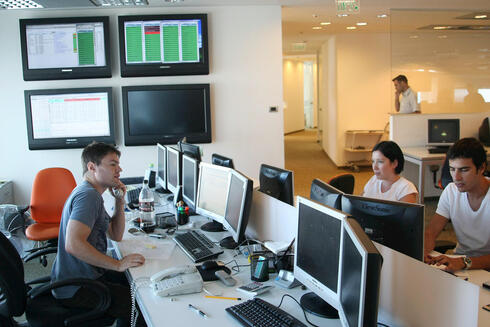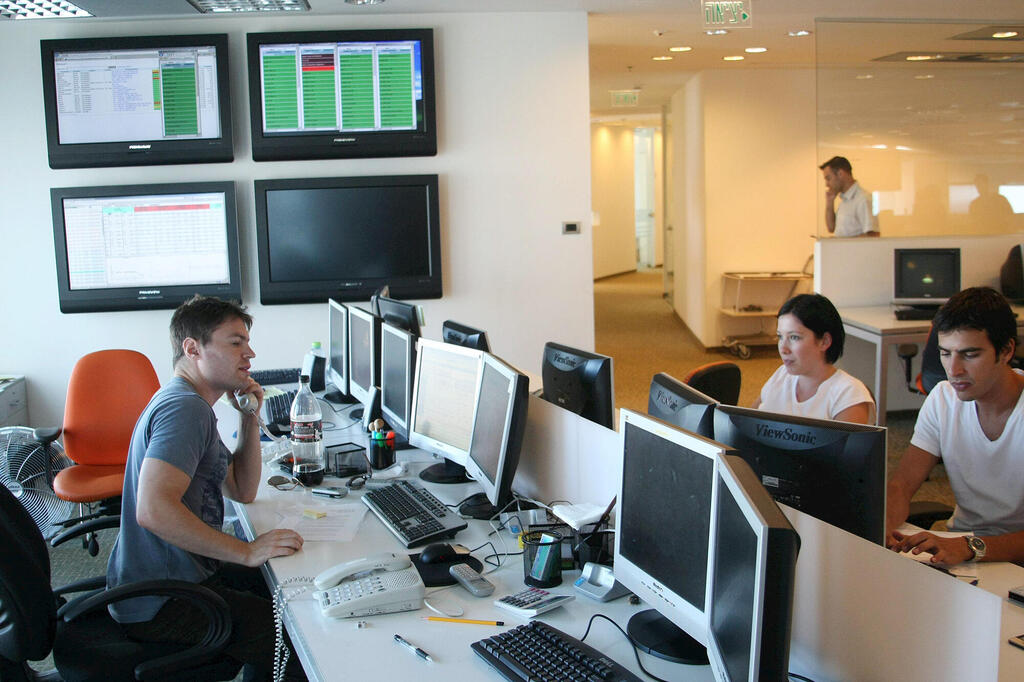
High-tech startups blocking secondary deals to save face and valuation
Tech employees got used to exercising options in secondary transactions during the good years, but now they are increasingly facing a refusal from their companies who fear that such deals will reveal the drop in their valuation and also bring in unwanted shareholders
"There are a lot of stressed workers and pre-Seed investors who need the money today. There are also buyers on the other side, who are interested in their shares, but 50% of the deals that are signed between them fall through," Moran Chamsi, co-founder and general partner of Amplefields Investments, which purchases shares in high-tech companies privately, told Calcalist.
These transactions are called "secondary" deals, meaning a secondary sale of shares by existing shareholders, mostly employees of high-tech companies and investors who entered at very early stages.
These shares of the private high-tech companies do not have a price determined by the market and their value is determined through negotiations between the parties. The reason that deals that both parties apparently want end up falling through, lies in the fact that they have a third and central party without whom the deals cannot take place. This party is the high-tech company itself, which issued the shares to an employee or angel investor in the past, and ownership of these shares cannot be transferred without the approval of the company and its board of directors. As long as the company itself initiated the sale of the shares at the same time as it was raising funds, the problem did not exist, but in the current reality there is often a conflict of interests between the company and the employees.
Because of the pressure from the employees to sell the shares, they are willing to do so at a relatively low value - which is also the reason for the increased interest of the secondary funds in the transactions. Both Chamsi and Tamara Direktor, who heads the YOLO fund, which also specializes in secondary transactions, talk about value levels that are at least 40% lower than the value in the last funding round, and there are cases where the discount reaches 70% of the last known value. From the point of view of the employee it is still a profit, even if smaller than what they dreamed of, but from the point of view of the companies this is bad news. Such deals leak to investors and if the company is in the process of raising capital and strives for a higher value, a "side" deal carried out by its employees can lead to a lowering of the value by the fund. Another reason for the companies' refusal to approve the secondary transactions also stems from the identity of the buyers. Although secondary investors do not seek to appoint representatives to the board of directors, the directors of the companies have no interest in introducing new and not always familiar entities and names to the list of shareholders. What's more, a large number of small shareholders may complicate matters later, if the company wants to go public.
"The rate of transactions which reach the finish line is very low due to the differences between value, timing and the right of the buyer," says Chamsi. "An investor who invested in a unicorn at a very early stage at a value of a few millions, won't really mind if the value in the secondary deal is 'only' a billion dollars and not $2.5 billion. They mainly need the money now to make new investments. So does an employee who took on a real estate obligation. These are the common reasons. On the one hand, the companies want to help the investors and the employees, especially the veterans who are often important to them, but they cannot afford to sign off on such a valuation. We had a deal with a former senior manager of a company, who wanted to redeem his shares and it turned out in hindsight that the company was in the middle of a funding round."
According to Chamsi, the companies have also realized that these deals are not a trend but a real need, and therefore from their side there is also a desire to establish clear rules of the game.
In order to solve these gaps, a new initiative aims to formulate rules that would regulate the secondary market and introduce certainty into it for all parties. "Just as it was when the options became a reward tool for employees and it took time until clear paths of allocation, exercise and taxation were formulated - the secondary market is also maturing," says Yael Shimon-Many, a partner at the Pearl Cohen law office, who specializes in mergers and acquisitions, and who leads the initiative together with the Amplefields fund and the accounting firm KPMG. “With options, the issue had been brewing over the years and the need and understanding that it needs to be regulated came from within the industry.
"Due to the current situation in high-tech, this is the time to put things on a more regulated path, which will come from an agreement of the three sides.”
The plan is to draw up a uniform appendix to the options agreement. "A time of crisis is a good opportunity to clean out the stables and build a new infrastructure. We hear that all parties are not satisfied, and it's just like it was with the options in the past. The issue has since been settled, an unwritten standard has been created and the companies work according to that practice," says Chamsi. One of the solutions being examined is setting fixed dates once or twice a year, a kind of "exit stations", when it will be possible to carry out secondary transactions. In this way, the companies will not have to constantly deal with individual transactions of each employee. Another direction that will be examined is the limitation of the value to a certain range from the value at the company's last funding round. At the same time, a regulated process will be established that will add certainty and limit the costs to all parties. Another aspect that needs to be resolved is the absence of a time limit, with the current plan being to limit the realization to 12-18 months from the date of maturity.
The subject of taxation also needs to be settled, since today an employee who leaves the company can purchase their options and convert them into shares for only 90 days. This involves a high cost that often pushes the workers to take a loan. If the shares are used as collateral in such a loan, the profit from them is taxed at a rate of 50% instead of 25%.
Why is there pressure to make secondary deals today, outside of the company's routine funding rounds? During the boom in high-tech, the industry's employees got used to netting handsome sums of cash on an almost regular basis as part of the funding rounds conducted by the companies. Secondary transactions became an accepted practice and allowed employees and investors in the very initial stages of companies to sell some of their shares at the same time as the company raised capital.
At the peak of the tide, full secondary transactions were even conducted in companies such as Moon Active, where the company did not need a cash infusion itself, but following demand from investors, it offered its employees and first investors to sell their shares. Thus, for example, a secondary deal of $125 million was completed by Moon Active in 2021. Another record was set by Trax, when almost half of the $640 million raised flowed into the employees' pockets. According to estimates, in the three years of the high tide, the volume of secondary transactions approached $5 billion in Israel. In the U.S., the volume of these transactions reached $400 billion between 2019 and 2022, according to the investment bank Jefferies.
But the nature of secondary transactions has changed fundamentally since the second half of 2022. Trax has conducted layoffs, as have many companies that secured secondary transactions. The slowdown has meant companies are avoiding raising new capital to ensure they don't suffer a drop in value. On the other hand, many employees who became accustomed to almost constant rounds of secondaries in the last four years, have taken on quite a few obligations such as purchasing real estate. Now, in order to meet the payments, they need an investor to buy the shares from them and this is where the problem arises that has become particularly painful in the high-tech market.
"High-tech employees got used to having an almost permanent secondary, like an annual bonus, and suddenly it disappeared. We are hearing voices from the industry who perceive the lack of secondary transactions as almost a withholding of wages. Most of them need cash because it is time to pay the big payment for the apartment they purchased, but there are also some who have started to understand after the falls on Wall Street, that all their eggs are in one basket and they want to spread the risk," says Itay Ben-Ari, CEO of Elephant Brokerage, a company that trades in shares of private companies.
At the same time, early-stage investors understand that the IPO market will not gather steam soon, which means that it will not be possible to receive a return on their investment in this way and that other routes must be sought, especially if they want to take advantage of the current value levels, which are lower than in recent years, to make new investments.
According to Ben-Ari, in the U.S., accepted rules of the game have developed around secondary deals and there are almost no cases where the companies reject the transactions. He points out that there is also more openness on the part of the companies in Israel and there are some that even share information about the performance with the secondary funds, in order to justify a higher value In a deal with an employee.














